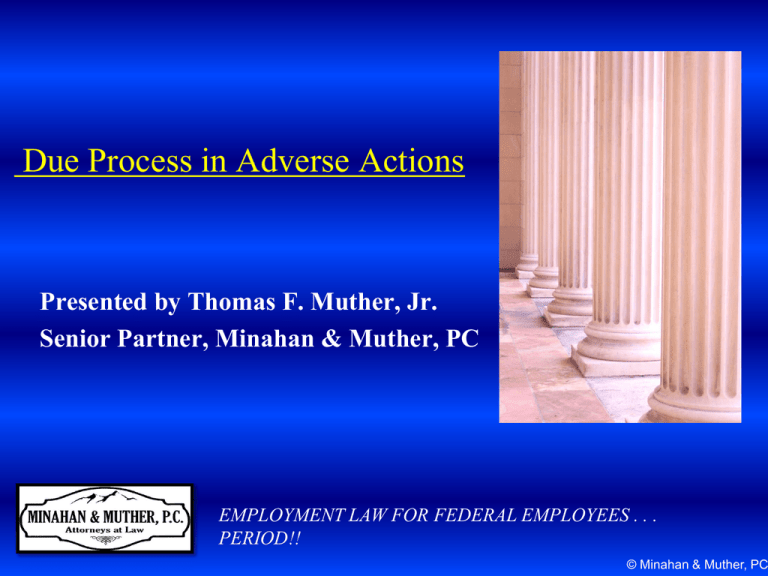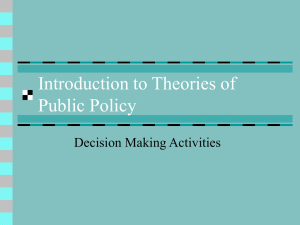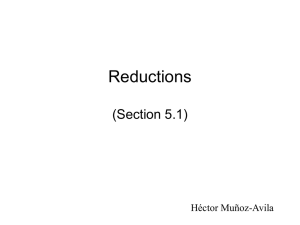NAPS Due Process Training in Power Point
advertisement

Due Process in Adverse Actions Presented by Thomas F. Muther, Jr. Senior Partner, Minahan & Muther, PC EMPLOYMENT LAW FOR FEDERAL EMPLOYEES . . . PERIOD!! © Minahan & Muther, PC Appeal System Required By Law The U.S. Supreme Court: A tenured public employee has a “property interest” in his or her employment that cannot be taken away without due process of law. Cleveland Bd. of Education v. Loudermill, 470 U.S. 532, 538 (1985). Fundamental Due Process 5 U.S.C. § 7513(b)(1): An employee must receive advance written notice stating the specific reasons for the proposed adverse action. The agency must state the specific reasons for a proposed adverse action in sufficient detail to allow the employee to make an informed reply and defend the case. The Board cannot consider or sustain charges or specifications that are not included in the notice of a proposed adverse action. Ex Parte Communications Stone v. FDIC, 179 F.3d 1368 (Fed. Cir. 1999): “The introduction of new and material information by means of ex parte communications to the deciding official undermines the public employee’s constitutional due process guarantee of notice ... and the opportunity to respond. . . . It is constitutionally impermissible to allow a deciding official to receive additional material information that may undermine the objectivity required to protect the fairness of the process.” Giannantonio v. U.S. Postal Service, 111 M.S.P.R. 99 (2009) Agency demoted Mr. Giannantonio based on failure to meet the duties and responsibilities of District Manager of Statistics. His employees measured workflow and time spent performing postal work. The proposal cited problems with the accuracy of the data collected and his employees’ work hours under the Fair Labor Standards Act (FLSA). After the oral reply, the deciding official received new and material statistical information from the Western Area Accounting Manager showing his overall national performance. The deciding official relied on the information in his decision to demote. Agency’s demotion reversed. Ward v. U.S. Postal Service, 634 F.3d 1274 (Fed. Cir. 2011) Mr. Ward is a preference-eligible Maintenance Mechanic at the U.S. Postal Service. He was removed on charges of shouting at a supervisor and disobeying her instructions. The deciding official testified at the Board hearing that he not only relied on the documents he was provided, he also discussed Mr. Ward with 4 other supervisors who told him about prior incidents when Mr. Ward was “loud” and “intimidating.” The deciding official testified in his penalty analysis that under Douglas this was a pattern of behavior he considered in making his decision. The Board in Ward The AJ in Ward upheld the removal because she distinguished between ex parte communications related to the charge versus those related to penalty in a Douglas analysis. The Board agreed with the AJ. The Court of Appeals for the Federal Circuit disagreed. The U.S. Court of Appeals for the Federal Circuit Held: Stone emphasized the importance of giving the employee notice of aggravating factors supporting an enhanced penalty and whether the level of penalty is appropriate. Ex parte communications that introduce new and material information whether related to the charge or the penalty violate due process. What is New and Material? Is the information merely cumulative? Did the employee otherwise know and have an opportunity to respond? Did the ex parte communication result in “undue pressure” upon the deciding official to rule in a particular manner? The Ward Result If new and material information – due process violation, the Board must reverse. If not new and material – perform a harmful error analysis. Harmful error is an “ ‘[e]rror by the agency in the application of its procedures that is likely to have caused the agency to reach a conclusion different from the one it would have reached in the absence or cure of the error.’ ” Ward Applies When No Ex Parte Communication Lopes v. Department of the Navy, 116 M.S.P.R. 470 (2011). Debra Lopes was an IT Specialist, GS-11. Her removal was proposed for misuse of a government computer and resources. The proposal did not mention prior discipline. The deciding official knew about her prior 3day suspension for misuse of her government credit card and considered it. Even though no ex parte communication, reversed based on Ward. Post-Ward Cases Ross-Rawlins v. U.S. Postal Service, DE-0752-11-0006- I-1 (Initial Decision, July 8, 2011, final when no PFR) (demotion reversed because deciding official spoke to manager and considered erroneous information that the appellant did not wish to return to her position). Silberman v. Department of Labor, 116 M.S.P.R. 501 (2011) (due process violation when the deciding official considered five memos (MFR) written by the supervisor with information about similar misconduct). Gray v. Department of Defense, 116 M.S.P.R. 461 (2011) (removal of auditor convicted of felony conspiracy reversed when deciding official considered an email about the appellant’s eligibility to occupy a security sensitive position). Non-Precedential Final Orders (NPFO) Ciciotti v. Department of Justice, CH-0752-10-0339- I-1 (Aug. 9, 2011)(reversed when deciding official considered special agent’s prior conduct during a state court action in determining penalty). Warren v. U.S. Postal Service, DC-0752-10-0530-I-1 (July 26, 2011) (remanded to AJ on the basis of the deciding official’s testimony on the Douglas factors that the employee’s performance was less than exemplary as this was not mentioned in proposal). Implications for Douglas in every case? QUESTIONS??? 14 Due Process in Adverse Actions Presented by Thomas F. Muther, Jr. Senior Partner, Minahan & Muther, PC EMPLOYMENT LAW FOR FEDERAL EMPLOYEES . . . PERIOD!! © Minahan & Muther, PC









